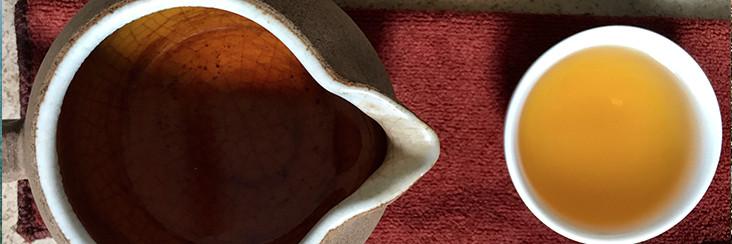
Hong Shui Oolong Tasting Notes | Eco-Cha Tea Club

Traditional processing methods are indicated in the appearance of the leaves shown above in two easily recognizable ways. A significant degree of oxidation is noticed by the light-brown hues on the stems and outer edges of the leaves. Secondly, the leaves are not as tightly rolled as the more modern versions of High Mountain Tea and competition grade Dong Ding Oolong. The size of the dried leaves also shows that they were allowed to mature on the plant before being harvested. Modern commercial tea production typically harvests the leaves when they are younger.

We recently heard a leading representative in the industry say that he believes the rich substantial flavor that we enjoyed up until 20 years ago, but is rarely found nowadays is primarily due to harvesting immature leaves. There is simply less substance in younger leaves, which are more easily processed to produce consistent quality when making lightly oxidized tea. Traditional tea production involves fewer harvests annually, with longer growing seasons. This obviously compromises the annual yield, which is a primary reason why traditionally made teas are not widely produced.

The rich reddish-amber hue of the brewed tea is also a clear indication of substantially oxidized tea leaves, especially since they were left unroasted. Hong Shui Oolong tea leaves are more heavily oxidized than its close cousin, Dong Ding Oolong. Dong Ding Oolong reaches a comparative level of rich, robust character due to the additional roasting process. Hong Shui is a more pure character in that the flavor profile is derived directly from the constituents in the leaves, whereas roasting is a type of "flavor enhancer", just as it is in the culinary world.

So Hong Shui Oolong has a slightly milder and sweeter character than Dong Ding, with a tangy, fruity profile that is reminiscent of fruit pastries or dried fruit. It has a robust, complex aroma, with a mild, sweet flavor profile. It also carries enough substance to offer a heady, yet clean finish. It's a character that, once it's familiar, it never gets old or boring.

We are excited to have the privilege to source this tea directly from local artisans who are proudly representing their tradition. We've been wanting to share this prototype of traditionally made Taiwanese tea with the Eco-Cha Tea Club since its beginning, and we finally made it happen! Please share your experience of this tea in the comments below, and we'll see you next month!

